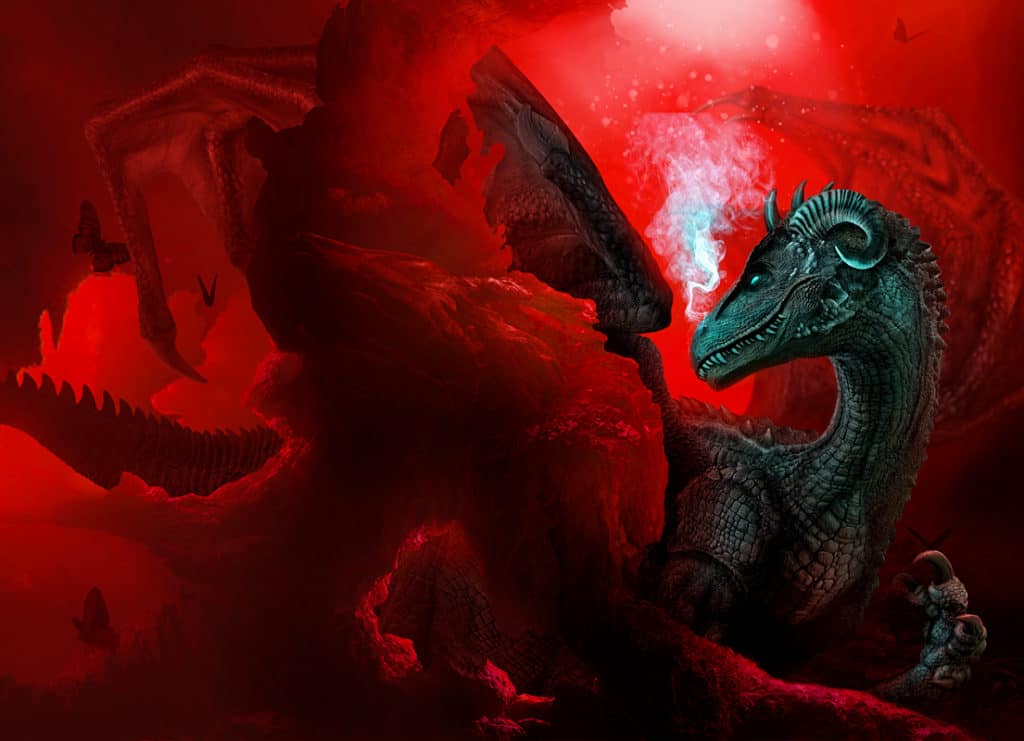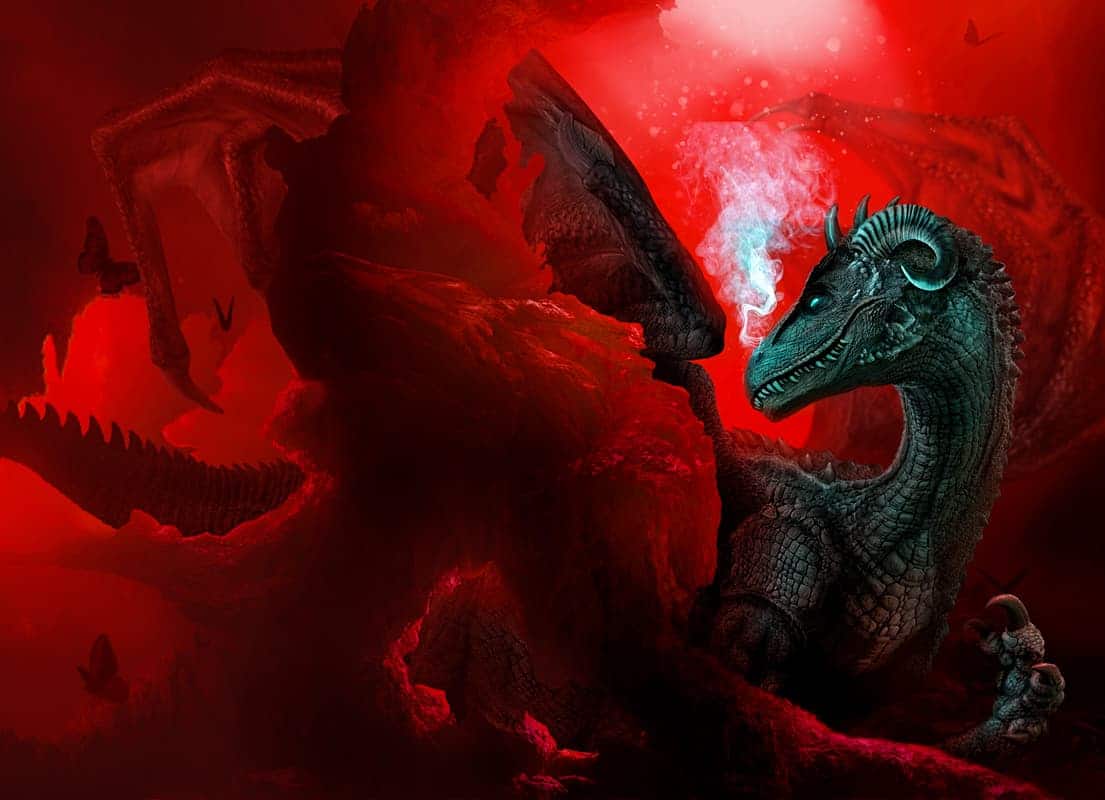New Guest Post by Aaron R. Holloway
We have all been a part of an RPG game or read a piece of writing where the DM or author has attempted to add dragons into the story because of their amazing and epic glory. We have all (hopefully) seen a situation where this worked wonderfully! Where everything from the clues, to the quest giving, to the final reveal and epic fight with the great dread wyrm was satisfying. We have all also been part of a situation (most likely) where this did not go over very well.

Writing dragons into your book, or campaign can be as epic as it can be anti-climactic. I know more than one GM (game master) or author who has worked diligently only to have the encounter fall flat on its face. I have had this very experience myself, where I wanted my heroes or players to face a fire breathing monster, fighting it, tracking it, and searching for it from the depths of the deep mines to the heights of the greatest mountains in the range the tyrant beast calls its home, finally smiting its body and leaving nothing but a smoking ruin upon the mountain side.
Or alternatively being devoured in flame and reduced to ash on the same said mountain side. I have had experiences where this worked very well, and experiences where the epic adventure I envisioned was quickly by passed by the low cunning of the dreaded and vile players (sense the sarcasm), that lead to a short and very unsatisfying ending for all involved (see the comment above about them being turned to ash).
Here are a few tips I’ve learned over the years as both a DM/GM and armature writer, that might be of some help to you as you attempt to include these great and epic lizards of fire, wings, claws and scales in your campaign or story.
Build Multiple Paths
This tip is primarily for the DM’s/GM’s out there. Think through at least three loose and easily malleable “path alternatives” to the main story or plot line that you are writing for your group of players. If you suspect that they might just head straight for the dark mountain peak where the creature lives instead of searching for your carefully laid out clues about its weaknesses, well, make sure you have something ready. Make sure that it will engage, entertain, and will potentially punish or reward them them for their choice of paths into the beast’s lair.
This is particularly important if its obvious from the get-go that they would have to do a bit of leveling before trying to tackle the big bad, its important to provide your players with incentive to listen to you, and to pay attention to the game. If they choose to just hike up the mountain and wake the dragon as they go rather than finding the secret pathway through the ancient dwarven mines so they can ambush and kill it in its sleep. Well, the epic boss fight that
Try my AI Tabletop RPG generators...and an extensive library of content!
they’re trying to get to by bypassing everything else should be that much more difficult. Well, what if one of them summons a giant eagle to carry them half way up the mountain? You can partially reward them, without endangering the adventure side of the game. For example, you can make it so that the eagle won’t go all the way up the mountain (it can smell the dragon), maybe have another entrance into a higher level of the cave system available for use if needed.
Creating alternative paths, or at least having the ability to adapt to alternative paths that your players might come up with is vitally important. Players are sneaky creatures, and if you want this encounter to be satisfying for them, then you’re going to need to be quick on your feet with ways to both reward their ingenuity, while also coming up with new and even more difficult to overcome challenges. This often takes experience as a GM/DM that will come with time, but it is also something that you can gain by a proper level of loose-fitting preparation.
Build-in Rewards and Punishments
Rewards for good, creative thinking need to be available. Don’t be stodgy as a GM or even as a writer, give credit where credit is due to your players and characters. However, the same can be said the other way around. If a character or player does something foolish there need to be real world consequences. This can be a difficult thing for both GM’s and authors, as the players are our friends and the characters are our babies in a very emotional way. But if we ever want our friends to become better players, and our babies to become multi-dimensional characters, then such a system is crucial.
One way to do this that I’ve found useful is to create a list of positive and negative outcomes as rewards and punishments for good or foolish behavior, and then to tweak these depending on the situation. If your players or characters chose to perhaps try and find a little help, rather then taking the ancient mines up to the dragon’s ancient lair the second they learn about them, then perhaps reward them for their caution. A good example I’ve used before is adding a friendly NPC magic user to the party for a day or two, or as a writer, by writing in the village healer who is willing to make them some useful medical supplies they can use in the dungeon at no cost. A few other examples might be helpful in illustrating this point going both ways.
⚔️ Fantasy RPG Random Tables Books
Make life as a Gamemaster easier…
If you play Dungeons & Dragons, Pathfinder, or other fantasy RPGs, this
RPG random tables series
is packed with encounters, NPCs, treasure, and more. Available in eBook or print—either way, you’ll have a wealth of adventure ideas at your fingertips.
A player wanted to try and seduce a succubus? (Looking at you bard) Then maybe have the succubus drain them a level before his friends are able to rescue him (or perhaps some temporary negative, if you’re less vindictive them I am). Or on the positive side, they went and got their gear refitted to them, and upgraded after they cleared a floor in the dungeon? Maybe have a traveling merchant of fine, lightly used, magical items randomly rolling through town at that moment. I think you get the point, reward for smart behavior, punish for foolish.
This tip is important for GM’s but it’s even more so for authors. Authors need to ensure that there are real consequences to their characters behaviors, decisions, and personalities. If a
character is arrogant and maybe a little stupid and none of your other characters are there to stop them, have them do something stupid that causes a problem that your hero’s must face together (like punching the local Sheriff in the face and stealing his sword… yea that really happened once in a game I was DMing). Not only does this create additional outer conflict for your characters to overcome, it can create real internal conflict in your cast of characters and will aid in the foolish character’s and the casts development long term. Something that any author will tell you is often difficult to write while maintaining a coherent plot.
Build Suspense
This is vital, and the other two are really ways to do this last tip. In order to craft a satisfying encounter with a dread wyrm, a writer needs to build suspense. Personally, I look too mystery novels when I need to build suspense, and I take elements from them.
Examples could be things like clues to a dragon’s weakness. Things like a chink in its scales, an old injury from when it vied for dominance of the region against another dragon, or an old enemy that it was unable to kill but drove off. An enemy who is known to be hiding and biding its time until it can retake its home that the dragon stole from it.
Clues you find from the library, rumors you hear at the tavern, myths the local clerics and clergy preach about, legends told by old retired adventurers in town, and even minor sub-quests that contain pieces of information or items at the end as rewards that will help, are all good methods to help building suspense.
In addition to helpful clues, rumors, and legends, you need to include examples of the dragon’s fire and fury beyond the initial inciting incident. The burning down of a hovel on the periphery of its domain, the slaying of a powerful hero from legend, or the kidnaping of children by its kobold minions to feed it as sacrifices in exchange for power and protection, all while the heroes are gearing up, training, scouting and learning about their enemy are all good ways to do this. Have there be real stakes on the line.
The villainous wyrm must do villainous things, and the NPC’s, the towns folk, noble, duke, or merchant’s guild who hired them, need to react accordingly by grow increasingly paranoid and fearful as these events unfold and the hero’s take their time. The noble threatens seize their property, the merchant threatens not to pay them and find new hero’s, the peasants start talking about just leaving if the hero is unable to do what needs to be done, or the Duke threatens to raise an army to defeat the beast, something that they insinuate, might entail conscripting your players and their friends and family (If they have any).
In conclusion I’ll say this. All these things are important, building suspense, multi- pathing, and rewarding or punishing your players. But in all honesty the thing that is by far the most important in all of this? Is having fun. I know that as a writer we try to act professionally,
and as a DM/GM you try to craft the best encounters and stories possible. But what is the point of ether of these things, if you are not having at least a little bit of fun doing it?
Bonus Tip: Suggest to your players before you begin, that each of them write up a reason why their character is emotionally invested in the existence of a given region/person/thing that the dragon is threatening. They have a wife and kids that live there, they fought a great battle and have fond memories of the town’s inns and taverns, or perhaps they apprenticed with the towns cleric before finally taking holy orders and don’t want to see the old man burned alive.
⚔️ Fantasy RPG Random Tables Books
Make life as a Gamemaster easier…
If you play Dungeons & Dragons, Pathfinder, or other fantasy RPGs, this
RPG random tables series
is packed with encounters, NPCs, treasure, and more. Available in eBook or print—either way, you’ll have a wealth of adventure ideas at your fingertips.
Whatever they come up with, it will provide you an excuse to get them hooked on the quest and get them playing (always something that can be problematic for DMs. Authors can use this as a way to legitimately have strangely different people congregate in one area when the inciting event happens rather than simply the convenience of the plot.
Aaron Holloway is from Provo Utah. He has a Bachelors of Science in Political Science, and is muddling his way through a Master of Public Administration degree. He loves dragons, dungeons, and stories of danger. Be on the look out for his LitRPG book to be released later this year titled “Ethria: The Pioneer, An Epic LitRPG Adventure”










